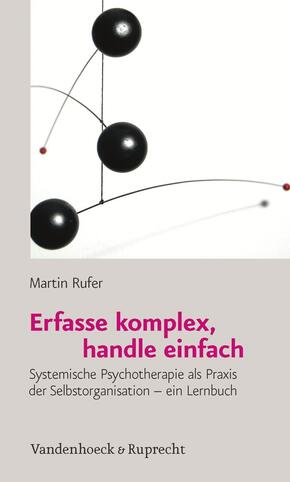Erfasse komplex, handle einfach - Systemische Psychotherapie als Praxis der Selbstorganisation - ein Lernbuch
| Verlag | Vandenhoeck & Ruprecht |
| Auflage | 2013 |
| Seiten | 271 |
| Format | 12,3 x 20,5 x 1,9 cm |
| Gewicht | 323 g |
| ISBN-10 | 3525401795 |
| ISBN-13 | 9783525401798 |
| Bestell-Nr | 52540179A |
Wie lassen sich therapeutische Prozesse verstehen und gestalten? Wer und was ist dabei wichtig? Woran liegt es, wenn es in Therapien hakt? Die Theorie der Selbstorganisation dient in diesem Lernbuch für Praktiker als Rahmen, um das Zusammenspiel von Therapeuten- und Klientenvariablen zu verstehen. Martin Rufer ergänzt Fallbeispiele aus seiner langjährigen Praxis um Überlegungen zu Auftrag, Setting, Interventionen und Stolpersteinen. Die generischen Prinzipien nach Haken und Schiepek dienen bei der Fallkonzeption als roter Faden und helfen, Komplexität zu reduzieren und einfach zu handeln.
Martin Rufers 30-jährige systemische Praxis ist mit jeder Zeile greifbar - ein Juwel für Psychotherapeuten jeder Couleur.
Psychotherapy as practical self-organization may sound complicated, but it actually isn´t. If we look at what Martin Rufer has accomplished, we quickly discover what is meant by this idea.How can we understand and shape therapeutic processes? Who and what is important? Why do some therapies falter and others succeed? In this volume the theory of self-organization forms the basic framework for practitioners to study and understand how therapist and client variables interface. Martin Rufer recounts many case examples from his decades-long experiences concerning the mandate, interventional strategies and stumbling blocks that can crop up in therapeutic settings. The generic principles according to Haken and Schiepek serve as the common theme for setting up cases and for reducing the complexity of the material in order to deal with the case directly and simply.
Martin Rufer presents a summary of his 30-year career as a systemic therapist a treasure trove for psychotherapists of all types.
Psychotherapy as practical self-organization may sound complicated, but it actually isn t. If we look at what Martin Rufer has accomplished, we quickly discover what is meant by this idea.How can we understand and shape therapeutic processes? Who and what is important? Why do some therapies falter and others succeed? In this volume the theory of self-organization forms the basic framework for practitioners to study and understand how therapist and client variables interface. Martin Rufer recounts many case examples from his decades-long experiences concerning the mandate, interventional strategies and stumbling blocks that can crop up in therapeutic settings. The generic principles according to Haken and Schiepek serve as the common theme for setting up cases and for reducing the complexity of the material in order to deal with the case directly and simply.




